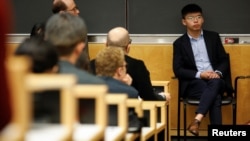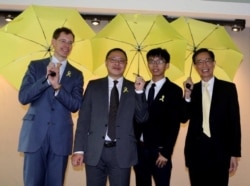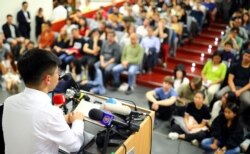Joshua Wong, one of the most visible leaders of the Hong Kong protest movement, has arrived in the United States to rally support following a whirlwind visit to Berlin.
Wong, who has been permitted to travel internationally while on bail facing charges stemming from more than three months of pro-democracy protests, will spend the next several days speaking to legislators, human rights advocates and students in New York and Washington.
College students are among the audiences Wong, 22, and fellow protest leaders are aiming to address on their U.S. tour, with a stop at New York's Columbia University on Friday and an appearance scheduled for Wednesday at Georgetown University in Washington.
Wong and other protest leaders will also testify at a hearing organized by the bipartisan Congressional-Executive Commission on China (CECC), aimed at examining recent developments in Hong Kong and the future of U.S.-Hong Kong relations.
Freedom House, an independent watchdog organization that monitors the status of freedom around the world, is hosting a special briefing featuring Wong and other "front-line activists" Tuesday at the U.S. Capitol Visitor Center.
While in Berlin earlier this week, Wong said at a press conference, "Hong Kong can serve as an example for the world to learn from."
Warmly welcomed by German lawmakers, Wong and Glacier Kwong, another front-line activist on the Berlin trip, signed a deal with the Sunday edition of Die Welt (The World) to contribute regular columns, providing a European outlet for their demands for greater autonomy for the territory under Chinese sovereign control.
Under an agreement with the former colonial power Britain, China has promised Hong Kong can maintain its free market system and democratic freedoms until 2047. But hundreds of thousands of people have turned out for marches to protest what Hong Kongers see as steady encroachment on those freedoms by Beijing.
In Washington, Wong is expected to voice support for the Hong Kong Human Rights and Democracy Act, a bill crafted by Senator Marco Rubio, which calls for a regular review of trade preferences granted to Hong Kong in light of its special status.
Crackdown threat
For weeks, Beijing has maintained security forces at its border with Hong Kong, raising fears that it will initiate a Tiananmen-style crackdown to end the protests.
At a recent diplomatic event in Washington, Randall Schriver, U.S. assistant secretary of defense for Indo-Pacific security, told VOA that Washington maintains regular contact with the Hong Kong government through the U.S. consulate there, "and we also, of course, have conveyed our concerns in Beijing about the potential for a heavier hand or use of violence, which we strongly discourage."
Schriver added, "We support freedom of expression in Hong Kong. We believe that's a right that is guaranteed under the Basic Law, so we're hopeful that this is resolved between the citizens of Hong Kong and the governing authorities there."
Winston Lord, who served as the United States' ambassador to China and later assistant secretary of State for East Asian and Pacific affairs, believes China's leaders will try a range of other measures before resorting to a crackdown and the global criticism that would bring.
"I think that through the combination of propaganda, nationalism, censorship, rounding up the leaders, getting the tycoons upset, playing up supposed violence, they hope to exhaust the protesters and win that way," Lord told VOA.
"They know it would be a mistake to go in there," he said. "Trust me, if they have to, they'll go in, but they're going to try to avoid that if at all possible."






